When you hear the term “artificial intelligence,” it may call to mind sci-fi films or advanced technology that you couldn’t even fathom understanding. But, the truth is that artificial intelligence (AI) is actually all around us these days. From Siri or Alexa to self-driving cars, new AI enhancements are landing in the news almost every day, promising to make life easier for us. And, while certain AI technology will undoubtedly deliver convenience and efficiency, it may raise some concerns as well. Will machine learning and robots eventually replace the need for human workers? What, then, will happen to the unemployment rate? We shouldn’t underestimate the value of human connection either. Isn’t artificial intelligence, well, artificial? Can it truly replace personal interaction? The answers to these questions aren’t clear-cut, but the fact is that AI is here to stay—whether we like it or not. The goal should be to coexist peacefully and efficiently with it, and there are many ways to achieve those ends. Rather than resisting the unknown, keep reading to learn more about AI and how it can become an extremely valuable part of your business.
When Did Artificial Intelligence Become Popular?
If you’re somewhat naturally resistant to artificial intelligence, it’s understandable because we all have a tendency to fear the unknown a bit. It’s helpful to remember that AI is still relatively new—only first recognized and researched starting in the mid-1940s. It has only risen to mainstream use and popularity in the last few decades, first taking off in the early 1980s. However, its acceptance at that time was short-lived. The industry was plagued by unreliability and fell in and out of favor until around the year 2000 when more technological advancements finally made it more trustworthy and accessible to the masses. It’s only been in the last two decades that AI has begun finding its way into everyday life for almost everyone—including, quite notably, many businesses.

Modern AI That Scales
Fast forward to today, and there are tons of case studies for how businesses have grown exponentially thanks to AI technology. The challenge with growth, though, is that previously used manual systems and processes can find it hard to keep up. That’s where scalable AI comes in.
What Is Scalable AI?
Scalable AI is a system that can evolve according to business needs by using algorithms, models, and data analysis to keep pace with the growth of the company and create new efficiencies. It sounds like a silver bullet for success, but it’s also not quite that simple. Building AI systems that complex can be complicated and expensive, but that doesn’t mean it’s unattainable either. Take, for instance, Capital One’s enterprise-wide implementation of scalable machine learning. There are many different types of advanced AI, and you can always take an incremental approach to implementation.
Types of AI Systems
When it comes to AI, your end goal can help determine what kind of technology makes the most sense for your organization. There are various types of AI that focus on different variables, employ different technology, and help you achieve different goals. Later in the article, we will discuss where you may want to consider applying AI to your business, but first, it may be helpful to understand a bit about the different kinds of AI applications available.
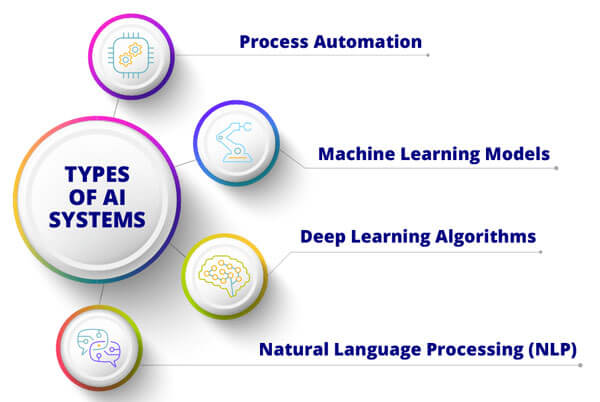 Process Automation
Process Automation
Process automation is probably the most common and recognized AI system today. This encompasses any time that a computer or automated system can replace the manual work of a human employee. It is often relatively easy to implement and can result in significant cost and time savings.
Machine Learning Models
Machine learning signifies that your computer systems can analyze and log data, as well as employ algorithms to build models that predict various outcomes. Based on the input data and the various scenarios experience, the algorithms will continue to evolve and improve.
Deep Learning Algorithms
As a subset of machine learning, deep learning is similar in that it also uses algorithms to make predictions, but the kind of data that it can use to inform its decisions can be less structured than general machine learning. Deep learning can analyze more variable and emotional content, such as images and speech, rather than just typical numerical data.
Natural Language Processing (NLP)
The goal of successful NLP is for a computer to undergo natural language processing the same way a human being does. With technology like this, processes like transcription or document summarization can be automated and completed much more quickly. There are many more subsets and nuances within each of these umbrellas, but these are a few of the most popular ways that AI is used across businesses in the present day. The field is also continuing to evolve every year, and the ultimate goal of AI is to create self-aware machines that can fully understand and mimic human intelligence, emotion, and behavior; however, despite what you may have seen in the movies, we are still decades or centuries away from creating anything that advanced.
Business Implications of Scalable AI
No matter what form of AI turns out to be the right fit for your organization, implementing it can come with some massive gains. Here are just a few ways that advanced AI can help transform your business:
Better Customer Experience
AI algorithms can easily ensure that your customers get served up more targeted info, products, and assistance. They’ll get what they need when they need it with minimal hoops to jump through. When this happens, it feels almost as if your business can read their mind, and they are perfectly primed to convert.
Increased Conversions
When customers feel as if you get them, they become fans. If you can follow up that first impression with high-quality products and services, they’ll become repeat customers and recommend you to others. Creating a highly customized and optimized customer experience is the key to more sales and a better net promoter score (NPS).
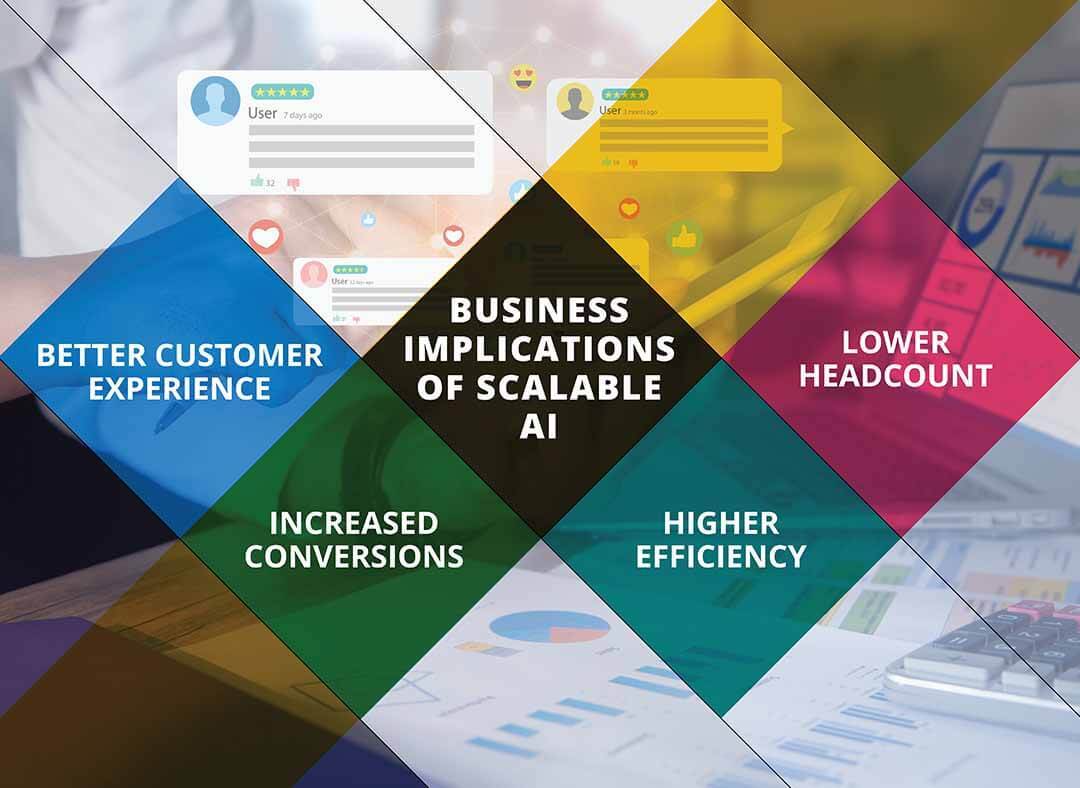 Higher Efficiency
Higher Efficiency
AI tools are data-based and largely automated. The technology will be constantly gathering information and iterating on autopilot. This allows so much more to get done faster and more accurately than when it is done manually. Time previously spent on information synthesis and process improvement should be reduced drastically because the technology will be able to do it on its own based on the data it collects.
Lower Headcount
Due to its automated and digital nature, AI can also easily replace several roles or consolidate tasks that would have previously required various employees to execute. This doesn’t mean that robots will eventually replace all human employees, though. Keep in mind that there will also be a need to add resources (or train existing ones) to manage and update the AI as necessary. It can also be useful to have someone on staff who has their finger on the pulse of the tech industry; that person can help implement new technology as it emerges so you can always stay on the cutting edge.
Scalable AI Challenges
As mentioned earlier, it can be easy to assume scalable AI can be the perfect solution to your business needs. However, it doesn’t come without a few hurdles. Do your research and strongly consider whether AI is the right choice for your company before you take the plunge. Here are several challenges you may encounter if you choose to implement AI in your business:
Data Requirements
AI requires large amounts of data in order to create informed and accurate solutions. Insufficient data can produce faulty functionality, so if you are a startup or smaller business, you may not have robust-enough data sets for AI to truly work its magic. If it can’t draw clear conclusions from your data, it won’t be able to produce the results you’re looking for. In fact, when data sets are too small or too random, AI can actually make false assumptions that lead to unintended consequences.
Costs
While strong AI can help generate gains and savings, it can also be quite costly to implement and operate. Make sure the ends will justify the means before you allocate a huge budget to the project. And if you do think your investment in AI will pay off, make sure you have the money to invest in it in the first place.
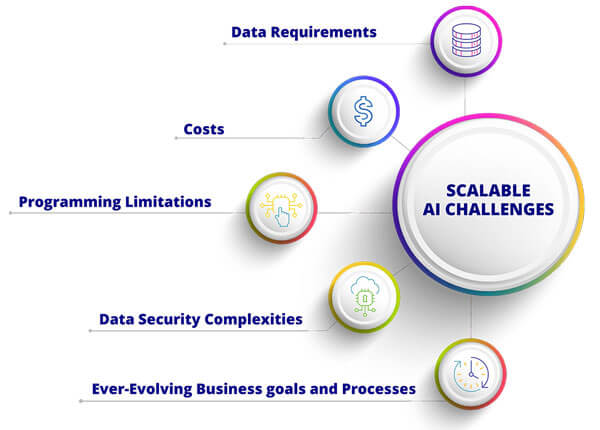 Programming Limitations
Programming Limitations
Situations and people can be complex and unpredictable. Even the best AI program can’t account for every single situation or individual’s behavior. When something occurs that AI was not programmed to account for, it is always possible that unfortunate consequences may result. For instance, a customer may become disgruntled when an automated chatbot cannot properly assist them, and they may complain to friends or dissuade others from using your company.
Data Security Complexities
The use and synthesis of so much sensitive data can make it hard to ensure that your organization is properly adhering to all privacy regulations at all times. Privacy law is constantly evolving, so if you are going to rely on AI systems for data collection, make sure to put a system in place to regularly check that your data security practices are compliant.
Ever-Evolving Business goals and Processes
A standard Ai program depends on certain variables. If any of these variables change within the business on any given day, those changes must be conveyed immediately and appropriately to the AI. While the computer may seem all-knowing, it only operates based on the data it is fed. Make sure it gets what it needs.
Scalable AI Benefits
While we’ve covered that AI certainly isn’t without its challenges, it is also chock full of possibilities for your company. If you’ve determined that none of the deterrents are enough to prevent you from giving it a shot, you’re in a position to gain some serious business momentum. The following are just a few ways AI can help you scale:
Fewer Human Errors
Regarding human intelligence versus artificial intelligence, a machine can compute and make decisions not just at a human level, but at a much faster and more accurate rate. The human brain simply cannot compete with artificial intelligence. No more worrying about mistyping numbers or accidentally skipping lines of spreadsheets. With AI, computer science bears the burden of compiling and sorting data, and it can be reliably counted on to do so with great accuracy.
Faster Timelines
AI helps organizations predict better and react faster so things can get done on tighter timelines and with greater efficiency. What used to take weeks or months to sort through, parse, and take action on, can happen in just minutes or even seconds with scalable AI.
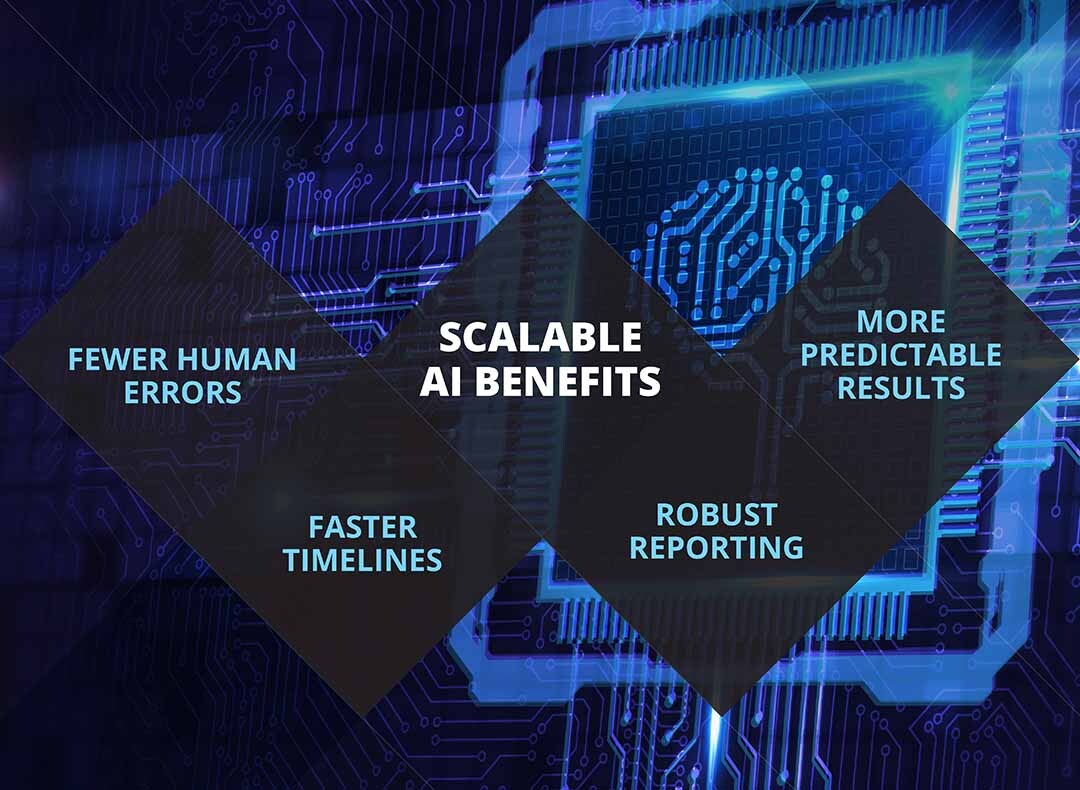 Robust Reporting
Robust Reporting
Because AI requires so much data to operate successfully, you have lots of pertinent information at your fingertips to help inform business decisions and marketing strategies. In fact, you can even use AI to automatically generate reports for you.
More Predictable Results
With scalable AI, ad campaigns and client interactions are based on and tailored to real-time customer behavior. AI gives you the ability to consistently and quickly pivot, as needed, to create the best experience possible and drive the outcomes you most want to achieve.
How You Can Apply AI Tools to Your Business
If you’ve decided that scalable AI is something worth exploring for your business, there are a wealth of industries and areas that it can help improve. Even if you don’t have the budget or data volume to roll out AI across your entire organization, it may still be possible to apply it to just one department or process. It’s a good way to test the waters and confirm that AI is the right choice before you do a complete overhaul of your systems. Take a look at these examples of how AI technologies can make a difference in various business sectors:
Customer Experience & AI
As mentioned earlier, AI is a great tool for assessing customers’ behavior and learning how to identify their needs. Chatbots are still on the rise and are getting smarter and more robust every day. When you can easily answer a customer’s questions instantly, without them having to wait in a queue or get routed to the wrong department, people will likely appreciate the convenience, stay loyal to your brand, and recommend you to others.
Targeted Marketing & AI
Targeted marketing is one of the best ways to implement AI in order to boost sales. Similar to how AI can help improve customer experience, it can make intelligently informed suggestions to audiences. For instance, it can make connections among products and behaviors, so someone will be more likely to see suggestions for highly relevant related products on a page that they are browsing for something of interest. AI makes it as easy as possible for people to get everything they want without having to search very hard for it.
Supply Chain & AI
How much smoother could things run if a computer could reliably forecast trends and automatically adjust inventory or sales accordingly? AI can help make this possible so you no longer end up with surpluses or shortages of too many products. Your supply chain may already employ some form of automated technology, but there may be even more advanced functionality available that you are missing out on because the field of AI is expanding so rapidly.
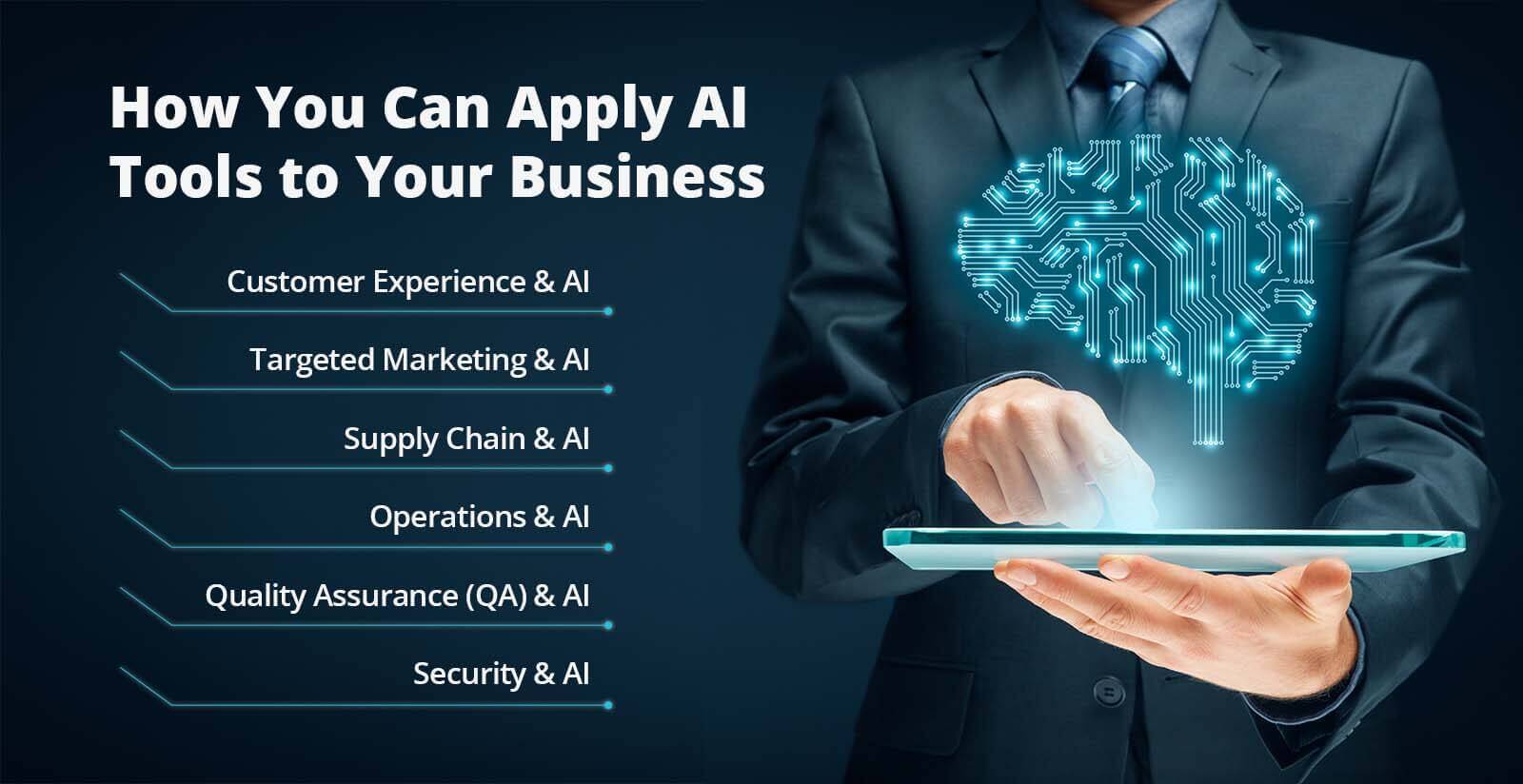
Operations & AI
Efficiency, efficiency, efficiency. AI is great at automating processes. When you can use AI to quickly complete long, tedious tasks, you can free up more of your employees’ time to work on the things they excel at and enjoy most. When employees are happier, you deal with less turnover and the associated costs and obstacles of recruiting and training. The data synthesis that AI can do also helps you make more informed business decisions that can lead to better outcomes on faster timelines.
Quality Assurance (QA) & AI
Using AI in your QA processes can bring a greater level of standardization to your products and services. Relying on AI minimizes your risk because there is a smaller margin of error than when relying on an evaluation from a human being. This helps give you the peace of mind that you are delivering the same quality product every time, which will keep your customers happy and establish a trustworthy reputation.
Security & AI
Security may be a field that already relies heavily on technology to function well, but hackers and other cyber attacks are getting more advanced every day. Luckily, so is AI. Keeping up to date on the latest AI technology means always having the most sophisticated algorithms at your disposal to recognize and protect against threats to your system. In a day and age where data breaches are quite common, you can cultivate a reputation for keeping your customers’ sensitive information safer than most.
Case Study: How ISG Uses Artificial Intelligence to Optimize the Customer Experience
At ISG, we use AI to deliver a world-class customer service experience—no matter what product we’re selling. Our proprietary technology and integrations route every caller to the right agent in the right department every time. This is determined by a number of factors about each caller that are evaluated as they enter our interactive voice response (IVR) systems. Then, the AI determines which department and agent will result in the most favorable outcome and routes the caller accordingly. Our AI also provides regular feedback for process improvement. It recognizes certain linguistic events on our calls that we can then learn from. We use these learnings to train our agents more accurately and efficiently. When they know what behaviors to avoid or what scenarios to expect, they can perform at a higher level with more confidence. These AI solutions help ensure a winning result for the caller, the agent, and the partners we support. Our agents get the kinds of calls they know how to handle, our customers get five-star service and the products they’re looking for, and our partners get reliable sales performance.
 Take the Next Step Toward AI Success
Take the Next Step Toward AI Success
Interested in implementing AI to improve your customer experience and conversion rates? We can help you replicate our success. We have a proven track record with partners across a wide variety of industries. Reach out today to learn more.
